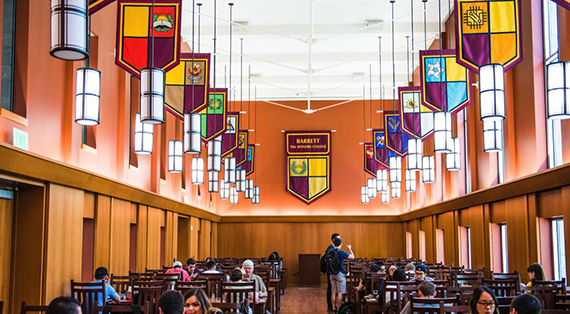
By Elizabeth LaScala, PhD
Honors programs and honors colleges are ways for academically talented students to reap the rewards of a smaller liberal arts and sciences education within the context of a large research institution. There are some important differences. An honors college is a separate and unique residential college experience. Qualified students who attend get the best of both worlds—a smaller academically focused residential learning environment while enjoying the wider social and cultural benefits of attending a large, research university. Honors programs are programs you fulfill as you get your degree within one of the university’s colleges or schools. Either way, the honors experience typically encompasses smaller class sizes, senior instructors, priority registration, active mentorship and access to research opportunities. A couple of examples of these types of programs will help you to better understand the differences and benefits.
Ranked #1 in innovation by U.S. News for five years, Arizona State University’s Barrett Honors College boasts a curriculum, endowment, and an entire campus dedicated to its residents. Barrett students live in their own dorms and complete a set of academic requirements that emphasizes small class size and critical thinking skills. “The Human Event,” a seminar required for all Barrett Honors College students, focuses on intellectual and social themes throughout human history, intertwining them with disciplines from philosophy to science–just one of many Barrett courses that uses an interdisciplinary approach to cultivate critical thinking. Among academic opportunities exclusive to Barrett students is the Global Explorers Grant, providing students $5,000 to support a global research experience that helps develop a Barrett Honors Thesis.
Each year, a select number of freshman applicants to Cal Poly San Luis Obispo are invited by the university to apply to the honors program. Admitted students take a total of eleven honors courses throughout their four years. Freshmen start with a year-long course that emphasizes project-based learning, service, and equity, and students continue with five honors electives throughout their four years. The program extends well beyond course work; students must complete leadership, mentorship, and an approved honor track experience. Students benefit from small class sizes, exclusive honors course access, and their own section of Cal Poly SLO’s Kennedy Library.
Boston University’s Kilachand Honors College immerses undergraduates in a four-year curriculum, emphasizing interdisciplinary study and global issues, that is completed alongside a student’s major requirements. In their first year, Kilachand students take two seminars that explore contemporary questions, with offerings ranging from biomedicine to art. In the second and third year, faculty across disciplines aid students in engaging in the process of inquiry, scholarly research, and understanding the world’s most pressing problems and possible solutions. Study at Kilachand culminates in each student’s presentation of a Keystone Project, in which the student presents work on scholarly research, creativity, or invention prior to graduation.
A select group of incoming freshmen at Syracuse University are invited to join the Renee Crown University Honors Program. As freshmen, these students can opt to live in an Honors Living Community with other members of the program. However, admission to the Honors Program is not limited to incoming freshmen; students may apply after their first or second semester at SU. Included in honors coursework requirements are two Global Awareness classes, at least one of which must be non-Eurocentric, and an Honors Thesis Project related to a student’s major is required for graduation. Perhaps one of the most important parts of the Syracuse Honors experience is community service: students are required to complete a minimum of fifty civic engagement hours spanning at least three semesters.
Many large research institutions offer honors colleges or programs, providing gifted students access to small classes, mentorship, community and research opportunities. Researching these programs as part of the college application process could lead you to find a specialized college experience unique to your needs. Read more about public honors colleges in my article “The Up and Downsides to Public Honors Colleges.”
Now more than ever, a college education is an essential first step toward a fulfilling career. I am an expert at college matching and have made it my business to stay up to date and informed on the dramatic and ever-changing impact COVID-19 is having on higher education. Staying current and compassionate are critical to providing my students and their families with the information they need for wise decision-making. I encourage you to contact me now for a courtesy consultation.



